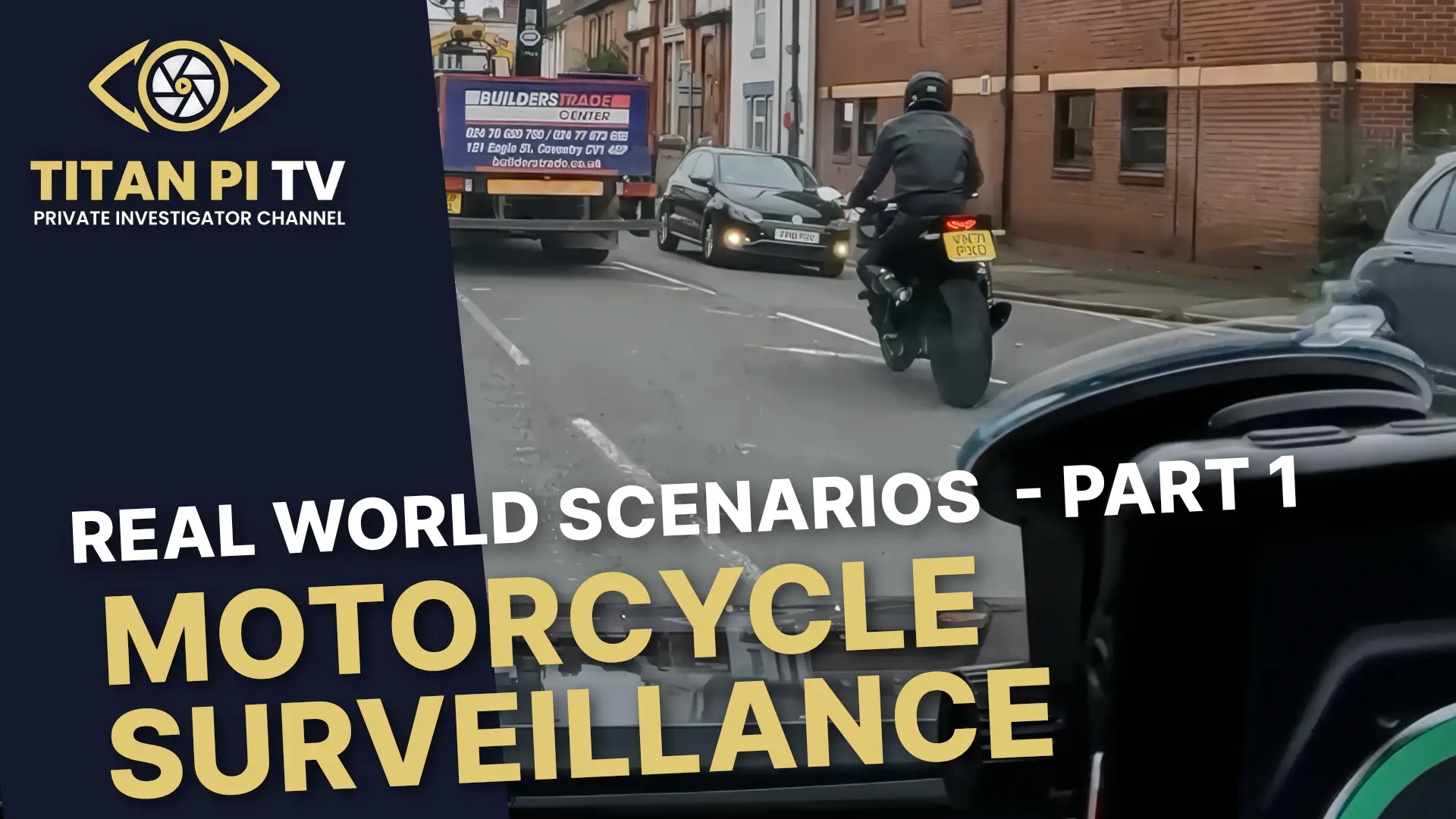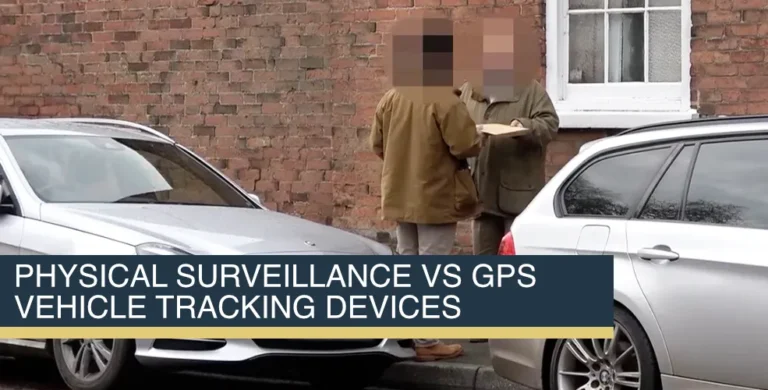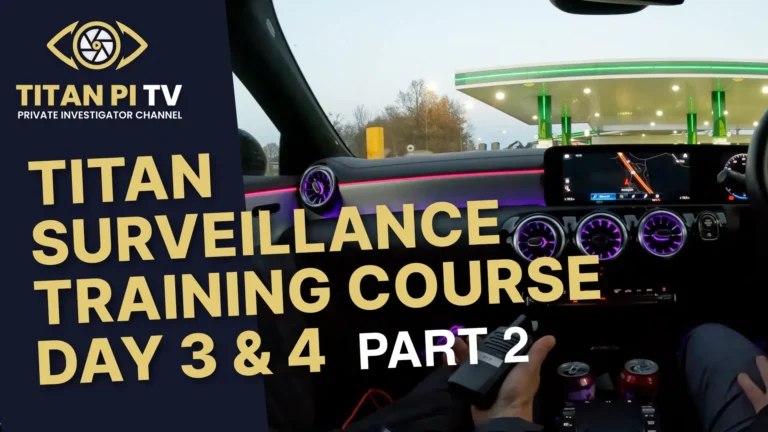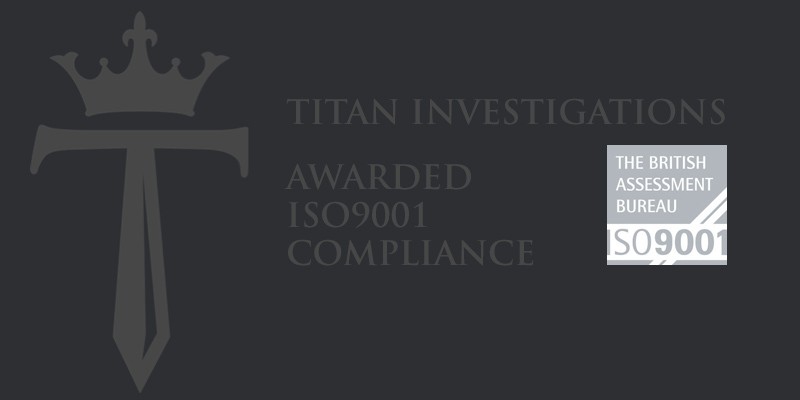Specialist Motorcycle Surveillance: Real-World Scenarios – Part 1
In the high-stakes world of private investigations, few roles demand the blend of skill, precision, and adaptability required of the surveillance motorcyclist. These highly trained professionals are tasked with the delicate balance of tracking subjects while remaining undetected, often in fast-moving urban environments where every second counts.
In this two-part blog series, we explore the challenges and strategies inherent to motorcycle surveillance, showcasing real-world scenarios that highlight the expertise needed to excel in this specialised field. As we delve into the operations of the renowned investigation agency Titan PI, we uncover how their motorcyclists tackle the demands of dynamic, high-pressure environments with professionalism and ingenuity.
The Importance of Motorcycle Surveillance
The use of motorcycles in surveillance offers significant advantages over traditional vehicles. Their unique capabilities make them indispensable for complex investigations, particularly in dense urban settings. Key benefits include:
- Unmatched Agility: Motorcycles can manoeuvre through narrow alleys, congested traffic, and tight urban layouts, ensuring they maintain contact even when the subject takes unconventional routes.
- Stealth and Discretion: With a smaller profile and quieter engines, motorcycles are less likely to draw attention, allowing surveillance operatives to track subjects without arousing suspicion.
- Rapid Response Times: Motorcyclists can quickly adapt to abrupt changes in the subject’s speed or direction, providing vital support to the rest of the surveillance team.
- Access to Restricted Areas: Motorcycles can reach locations inaccessible to cars, such as footpaths, construction zones, or pedestrian-heavy areas.
These advantages make motorcycles an essential tool in the investigator’s arsenal, particularly when traditional methods risk compromising the operation.
Real-World Scenario 1: Navigating Roundabouts and Traffic Diversions
One of the most challenging situations for any surveillance team is navigating roundabouts and unexpected traffic diversions, where losing sight of the subject is a constant threat.
Maintaining Visual Contact
In this scenario, the lead vehicle, referred to as the “eye,” follows the subject vehicle approaching a roundabout. The team must remain vigilant, as roundabouts often create opportunities for the subject to take sudden, unpredictable exits.
The lead vehicle communicates the subject’s movements via radio:
“Approaching the roundabout, near-side lane. I’ve got no vehicles for cover. Near-side indicates, not the roundabout. On the roundabout, taking the first exit.”
Recognising the possibility of losing visual contact, the lead vehicle calls on the motorcyclist—the “solo”—to intervene.
“Solo, make ground.”
The solo acknowledges the instruction and moves swiftly into position, leveraging the motorcycle’s agility to approach the roundabout and maintain sight of the subject.
Seamless Handover
As the lead vehicle struggles to follow the subject through the roundabout due to heavy traffic, the solo steps in, reporting:
“Solo, yes, yes. Temp L, solo one, eyeball regained.”
This seamless transition ensures that the operation remains uninterrupted. The motorcyclist’s ability to anticipate challenges and respond quickly highlights their role as a critical linchpin in the team.
Adapting to Unforeseen Obstacles
Unexpected events, such as large vehicles obstructing traffic, further complicate surveillance. In such cases, the solo takes proactive measures to track the subject while providing detailed updates:
“Temp L, solo one, subject now entering A-side lane, proceeding past diversion signs.”
These updates allow the lead vehicle to reposition strategically, ensuring the team remains coordinated and in control.
Real-World Scenario 2: Multi-Exit Roundabouts and Repositioning
In this second scenario, the subject vehicle approaches a multi-exit roundabout, further testing the team’s coordination and the solo’s adaptability.
Anticipating the Subject’s Actions
As the subject vehicle approaches the roundabout, the lead vehicle communicates:
“Approaching another roundabout. Not one, not two… taking the third exit. Solo, make ground.”
Anticipating the subject’s direction, the motorcyclist positions themselves strategically to track the vehicle through the roundabout. This foresight prevents the surveillance team from losing the subject amidst the complexity of multiple exits.
Real-Time Coordination
The solo provides detailed commentary while tracking the subject, ensuring the lead vehicle has actionable intelligence to regain position:
“Eyeball regained. Subject now off-side lane, entering High Street direction.”
This real-time communication allows the team to remain cohesive, with each member understanding the subject’s location and movements.
Minimising Detection Risk
Motorcyclists must carefully manage their visibility to avoid arousing suspicion. By shadowing the subject at a safe distance and quickly handing back the visual to the lead vehicle when possible, the solo reduces their exposure, maintaining the integrity of the operation.
“Alpha One, back in position. Eyeball handed over.”
Key Lessons from Real-World Scenarios
These examples illustrate the unique demands of motorcycle surveillance and the key attributes required to succeed in this role:
- Proactive Anticipation: Effective motorcyclists think several steps ahead, predicting the subject’s movements and responding proactively to the lead vehicle’s instructions.
- Clear and Concise Communication: Seamless coordination hinges on accurate updates, enabling the team to respond effectively to changing dynamics.
- Adaptability: Urban environments are unpredictable, requiring motorcyclists to adjust their strategies on the fly while ensuring continuity in the operation.
- Discretion: Remaining undetected is paramount. Motorcyclists must master the art of blending into traffic and minimising their visibility during extended tracking.
- Teamwork and Trust: The motorcyclist’s role is part of a larger effort, requiring trust in their team members and a shared understanding of the mission’s objectives.
Conclusion
The world of motorcycle surveillance is as dynamic as it is demanding, requiring a unique combination of agility, discretion, and adaptability. As seen in these real-world scenarios, the surveillance motorcyclist plays an indispensable role in ensuring that investigations remain on track, even in the most challenging circumstances.
The dedication, training, and skill exhibited by Titan PI’s motorcyclists are a testament to the precision and professionalism required in this specialised field. From navigating complex urban layouts to maintaining clear communication under pressure, the solo exemplifies the critical qualities of a successful surveillance operative.
In the upcoming Part 2 of this series, we’ll delve into more advanced scenarios, exploring how motorcyclists tackle rural environments and dynamic handovers during extended operations. Stay tuned for further insights into this fascinating aspect of private investigations!
Specialist Motorcycle Surveillance Training
For further advice and information about becoming a Specialist Motorcycle Surveillance operative, then please feel free to speak to one of our professional team at one of the offices nearest to you.
London Motorcycle Surveillance Training – Call the Titan Investigations London Office 020 39046622
Birmingham Motorcycle Surveillance Training – Call the Titan Investigations Birmingham Office 0121 7162442
Cambridge Motorcycle Surveillance Training – Call the Titan Investigations Cambridge Office 01223 662022
Derby Motorcycle Surveillance Training – Call the Titan Investigations Derby (Head Office) 01332 504256
Leeds Motorcycle Surveillance Training – Call the Titan Investigations Leeds Office 0113 4574066
Leicester Motorcycle Surveillance Training – Call the Titan Investigations Leicester Office 0116 2436520
Nottingham Motorcycle Surveillance Training – Call the Titan Investigations Nottingham Office 0115 9646950
Manchester Motorcycle Surveillance Training – Call the Titan Investigations Office 0161 3023008
Sheffield Motorcycle Surveillance Training – Call the Titan Investigations Sheffield Office 0114 3499400
Truro Motorcycle Surveillance Training – Call the Titan Investigations Truro Office 01872 888706
Alternatively, you can contact us directly using our fully confidential contact form at enquiries@titaninvestigations.co.uk or chat directly using our Live Chat facility and one of our surveillance training course team will get right back to you.















